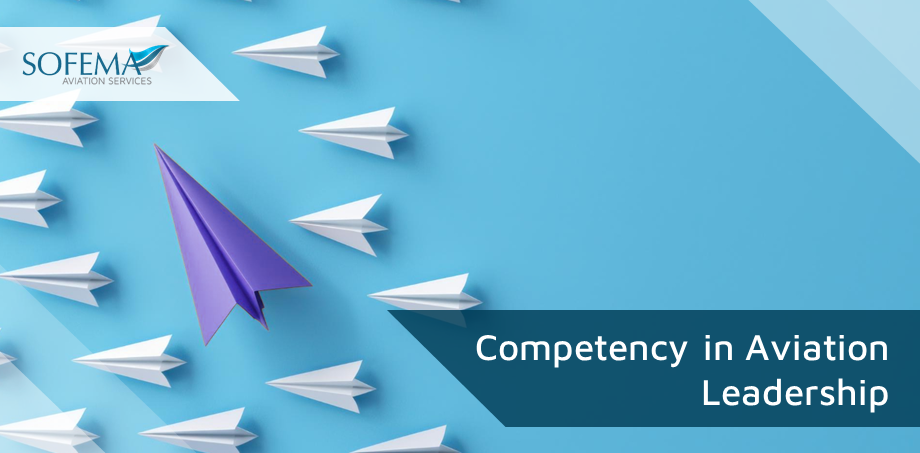Sofema Aviation Services (SAS) www.sassofia.com considers key aspects of effective competency in aviation leadership and management.
Introduction
Competency in aviation leadership refers to the amalgamation of skills, knowledge, abilities, and behaviours that enable individuals to perform their duties effectively.
- Competencies often serve as the basis for skill standards that specify the level of knowledge, skills, and abilities required for success in the workplace and potential measurement criteria for assessing competency attainment.
Competence is a measure of both proven skills and proven knowledge.
Aviation leaders can ensure high performance and safety standards by managing these competencies in themselves and others through continuous assessment, training, and development.
- This process, closely linked to Training Needs Analysis, provides a valuable opportunity for growth and improvement, benefiting employees and employers. Understanding the distinction between skills and competencies is essential for effective competency management, fostering a culture of excellence in the aviation industry.
Note – Some people incorrectly consider competence assessment a “negative” that someone is checking up on you – a “Big Brother” situation.
Please reject this notion. Competence Assessment should be directly connected to “Training Needs Analysis” (TNA), which means an opportunity to identify gaps and shortfalls and seek improvements.
Competence Assessment is an opportunity to benchmark where you are on your journey and support you going forward, and this is it.
The best part? It is a Win/Win for both the Employee & Employer
What’s the Difference between Skills & Competencies? (When implementing Competency Management, it is important, therefore, to understand the difference between Skills and Competencies)
What is a Skill?
- An ability and capacity acquired through deliberate, systematic, and sustained effort to smoothly and adaptively carry out complex activities or job functions involving
- a)Ideas (cognitive skills),
- b)Things (technical skills), and
- c)People (interpersonal skills).
A Skill is something Learned to be able to carry out one or more job functions.
What is a Competency?
Competencies specify the “how” (as opposed to the “what”) of performing job tasks or what the person needs to do the job successfully.
- Competency is more than just knowledge and skills.
– It involves meeting complex demands by drawing on and mobilizing psychosocial resources (including skills and attitudes) in a particular context.
Critical Competencies for Aviation Leaders:
- Technical Expertise: Proficiency in aviation systems, regulations, safety protocols, and operational procedures.
- Decision-Making: The capability to make timely and effective decisions, especially under pressure.
- Communication Skills: Communicating clearly and effectively with team members, stakeholders, and regulatory bodies.
- Emotional Intelligence: The capacity to understand and manage one’s emotions and those of others to foster a collaborative and productive work environment.
- Leadership and Team Management: Leading by example, motivating the team, and managing diverse groups of people.
- Adaptability: The ability to adjust to changing situations and environments, a crucial skill in the dynamic aviation industry.
- Safety Management: Prioritizing and maintaining high safety standards at all times.
Managing Competency in Self
Self-management involves continuous self-assessment, personal development, and adherence to high standards. Competence is a measure of both proven skills and proven knowledge. Here’s how aviation leaders can manage competency in themselves:
- Self-Assessment and Reflection: Regularly evaluate strengths and weaknesses through 360-degree feedback, self-reflection, and performance reviews.
- Continuous Learning: Keeping up-to-date with industry trends, technologies, and regulations through ongoing education, training, and professional development.
- Setting Personal Goals: Establishing clear, achievable personal and professional growth goals.
- Emotional Regulation: Develop strategies to manage stress, stay calm under pressure, and maintain a positive outlook.
- Health and Wellbeing: Ensuring physical and mental health through proper rest, nutrition, exercise, and work-life balance.
- Networking and Mentorship: Building relationships with peers and mentors to gain insights, advice, and support.
Managing Competency in Others
Managing competency in others involves fostering an environment that supports the development and performance of team members. Competency assessment is directly connected to Training Needs Analysis (TNA), providing an opportunity to benchmark where team members are on their journey and support them going forward. It’s a win/win for both the employee and the employer. Effective aviation leaders can achieve this through:
- Recruitment and Selection: Hiring individuals with the right skills, experience, and attitude.
- Training and Development: Providing comprehensive training programs, professional development opportunities, and continuous learning resources.
- Performance Management: Implementing regular performance reviews, feedback mechanisms, and development plans.
- Mentorship and Coaching: Offering guidance, support, and encouragement through formal and informal mentoring and coaching relationships.
- Creating a Positive Culture: Promoting a culture of safety, collaboration, and continuous improvement.
- Recognizing and Rewarding Excellence: Acknowledging and rewarding high performance and achievements to motivate and retain top talent.
- Conflict Resolution: To maintain a harmonious work environment, addressing and resolving conflicts efficiently.
- Team Building: Encouraging teamwork, communication, and a sense of belonging among team members.
Next Steps
Follow this link to our Library to find & download related documents for Free.
Sofema Aviation Services (SAS) www.sassofia.com and Sofema Online (SOL) www.sofemaonline.com offer Classroom, Webinar, & Online Training in Aviation Leadership Subjects, including our online Leadership Diploma. Please see the respective website or email team@sassofia.com
Tags:
Safety Management, Competence, Aviation Leadership, SAS blogs, Decision Making, Communication Skills, Aviation Leader, Emotional Intelligence, Adaptability, Competency Management, Technical Expertise, Leadership and Team Management, Self-Assessment and Reflection, Continuous Learning, Training and Development, Performance Management





